What are SMS scams?
Messages that might include a link to direct you to a fraudulent website or ask you for your personal information or from someone pretending to be a family member who needs money.
How to spot a scam
- There is a sense of urgency or threat to the message – “your bank account is overdue! Pay now” “Your account has been suspended” and includes a link to make the payment which directs you to a fraudulent website.
- You receive a message from a number you do not recognise claiming to be a family member and in need of money.
How to protect yourself
- Don’t be pressured into taking action.
- Don’t click on any hyperlinks or open attachments in an SMS.
- Contact the family member on a number you have sourced directly.
- We will never send you a message asking for your banking, personal information.
- We will never send you a message asking you to click on a link to activate your account or gain access to special offers.
- If you are unsure of a message you receive from Bendigo Bank, contact us directly or visit us in a branch.
- Don’t click on any hyperlinks or open attachments in an SMS.
Mum SMS message scam
An indicator of this SMS scam is when you receive an SMS message sent from "Mum" or "Dad" asking for money to be transferred urgently.
The SMS scam messages may vary, however if you unexpectedly receive a message to send money to a family member, always call them on their trusted number (one you have previously spoken to them on) to confirm the message.
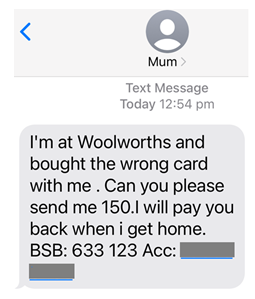
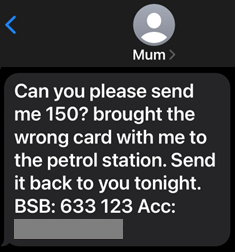
Fake Bendigo Bank SMS messages
Bendigo Bank will never ask you to click on a link in an SMS text message to login to e-banking. Do not click on the link.
We are aware of a SMS phishing campaign targeting Bendigo Bank customers. The messages claim to be from Bendigo Bank and include a website link. The link leads to a fake Bendigo Bank website asking you to login to e-banking.
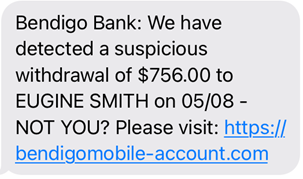
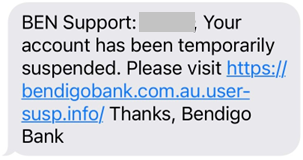
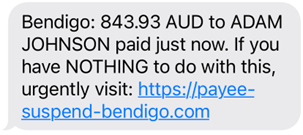
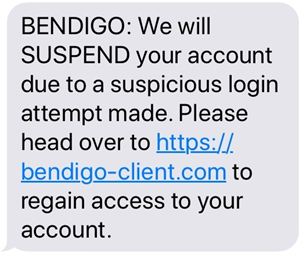
Sometimes an SMS alert is also sent prior to a ‘cold call scam’ that seemingly look like they are from Bendigo Bank.
This is achieved using another method known as ‘alpha tags’ to make messages appear in a thread of legitimate messages sent from us. Unfortunately, there is currently no feasible way to intervene or prevent this from occurring.
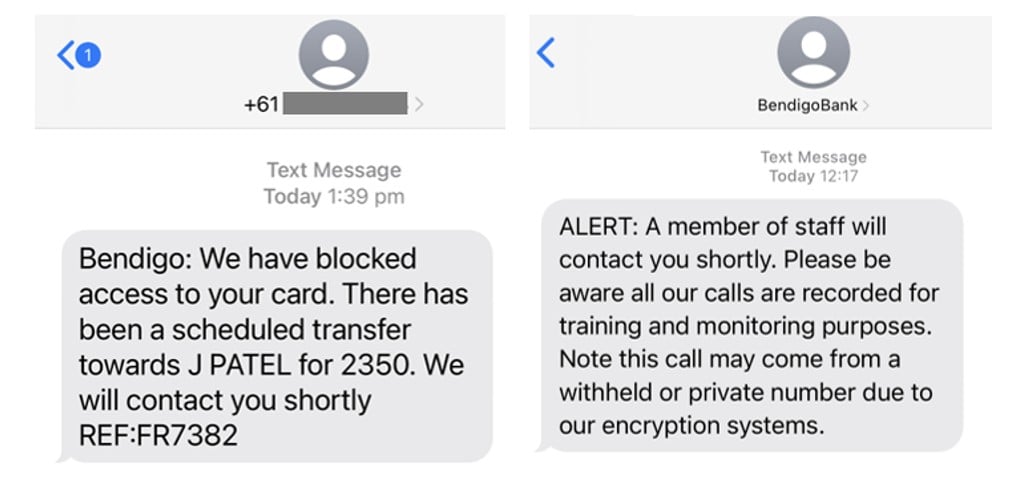
Let us know ASAP if you think you have been the victim of a scam
Things to remember
- Never provide your 6-digit e-banking security code to anyone - in person, over the phone or online even if they claim to work for your bank and have personal information about you.
- Never provide a caller with remote access to your computer.
- We will never ask you for your e-banking PIN, e-banking password or 6-digit e-banking security code.
- We will never ask you to login to e-banking via a link sent in an SMS or sent in an email.
- We may call from time to time and ask to verify your identity by asking for your verbal password. However, we will never ask you for any PIN, password or security code relating to your e-banking. If you feel uncomfortable, you can always verify our branch contact details on our website and call us back.
If you need help or more information
Phone
If you have clicked on any suspicious links and entered your e-banking details:
Call 1300 236 344 (in Australia) or +61 3 5445 0666 (from overseas - standard international call charges apply)
Monday to Friday - 8am to 9pm AEST/AEDT*
Weekends (Saturday and Sunday) and some public holidays - 9am to 8pm AEST/AEDT
*Excludes Christmas Day
SMS
If you have received a suspicious SMS message claiming to be from us, you can forward it to 0429 557 997 for investigation.
Please note you will not receive a personal response from 0429 557 997.
If you have received any suspicious emails, you can forward them to us via email.
Please note you will not receive a personal email response from us.


